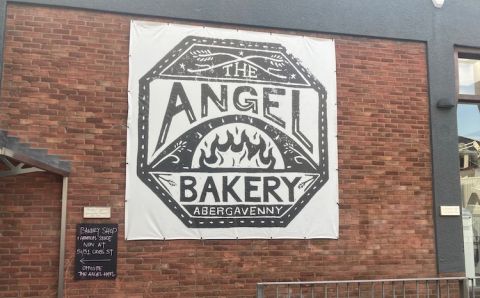Every time a new customer is seated in a restaurant, any ambitious chef and restaurateur is presented with an exciting challenge. They have the opportunity to titillate the customer’s taste buds untouched by any food or drink. And yet this is an opportunity that few rise to with aplomb.
I refer to the basic offer of the best bread and butter, a combination that is widely offered free of charge and is invariably made available long before the first course. And yet there are still far too many places where the bread is neither made on the premises nor the best it can be.
To discover why this is the case, I decided to sit down over an excellent dinner at The Walnut Tree Inn, just outside Abergavenny, Wales, with Adam Sellar, pictured there above.
Sellar, 43, has so far had an interesting career, cooking and more recently baking. Born in Newcastle, which he left after two months, he grew up on the Scottish isle of Islay where he worked every weekend and every holiday on a local farm and spent every Sunday morning for 17 years alongside his mother (whom he described as ‘his rock’) baking a loaf of bread.
It was a chef’s profession that he decided to follow, moving to London before fortune converted his skills into that of a baker. He was part of the team that set up Elliot’s restaurant in London Bridge, where an opening principle was that every customer would be presented with a basket of freshly baked, warm bread as soon as they were seated. From there he became one of the original founders of Little Bread Pedlar bakery in south London before moving to Abergavenny, where, as well as becoming an enthusiastic fell runner, he designed and planned the Angel Bakery next to the Angel Hotel.
From this rather secluded location, he planned and designed the bakery at Toklas, next to the admirable restaurant of the same name by London’s Strand, and is currently working on the design of a new bakery on the Norfolk coast, another in Llandeilo, Carmarthen, as well as one more in the Cotswolds.
I began by asking him whether he would describe himself as a bakery consultant? ‘I don’t think so’, he replied carefully. ‘I would like to describe myself more as a bread mentor, somebody who can instruct on a bakery’s layout and then bring the best out of a baking team. I also believe that by describing myself as a mentor I can pass on all the advice that I have picked up from Steve Williams at 40 Maltby Street, from the bakers at The Old Post Office Bakery in Clapham, from Andy Forbes of the Brockwell Bake Association, from Justin Gellatly who made his name at St John restaurant, and most of all from Dan Lepard for writing The Handmade Loaf. They are all fantastic people and fantastic bakers.’
Which brought me neatly to my next question: are bakers born or is it a skill which they acquire?
‘Wow that is a really difficult question’, Sellar responded. ‘What I believe comes as a shock to many people is the differences between cooking and baking well. Both require a considerable amount of motor controls to be turned on but they are very different. Bakers, in my experience, tend to be more tactile and more patient – it requires a certain amount of restraint to have your hands covered in sticky dough for most of the day, for example. And the slow speed of a good fermentation takes a certain type of brain to appreciate. Although these skills do come from somewhere, I believe that there are today too many techniques that require learning to say that bakers are born. But in any restaurant, the different pace at which bakers and chefs work can present a significant challenge. They ought to be in a symbiotic relationship but they rarely are.
‘In a restaurant that bakes its own bread it is as though a touch paper is lit but it will be eight hours before the bread is finally ready, while the Head Chef will be calling the orders for the starters and main courses and expect them to be ready within 10 minutes. Bread-making, whatever you are baking, is like lining up a kaleidoscope with all the different factors being the yeast, the baker, the flour, the time and the weather. To produce the final product correctly you need to line everything up properly and in the right order. It is a daily challenge.’
On top of this comes the space required to bake any restaurant’s bread properly and the increasingly prohibitive costs entailed. ‘Bakers need to start early when the kitchen is cool and there is easy access to the ovens. And then you need a second shift to come in and cook for the dinner service and stay until the end of service. These costs mount up’, Sellar explained.
The arrival of a couple of warm buttermilk loaves with salted butter promptly silenced us both. But it allowed me to ask Sellar a final question, ‘Which is his favourite roll or loaf?’ I asked. He was quiet for a long time before responding with slight embarrassment, ‘A Morton roll, the Glasgow staple.’ It would appear that in this instance you can take the baker out of Scotland but not Scotland out of the baker.
Restaurants that bake their own bread include
Ballymaloe, County Cork, Ireland
Brat, London
Cafe St Honoré, Edinburgh
Kitchen Table, London
Noble Rot, London















